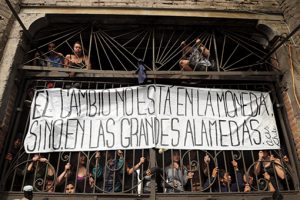Finding Gaston—And Peru’s Gastronomic Heritage
Food is powerful. After breathing, we all have to eat. And food can bring people together for celebrations or in times of sadness. In Peru, food has become the glue that has held together a nation that experienced difficult times over the last forty years. And today food has made Peru one of the most … Read more
Peru’s Congress Approves New Cabinet
Following a week of debate, Peru’s Congress approved President Ollanta Humala’s new 20-person cabinet yesterday, which will be led by Prime Minister Ana Jara. The cabinet was voted on a third time after the first two votes had too many abstentions to be valid, and approval was ultimately granted by a minimal margin for victory: … Read more
FARC Addresses Reparations for Conflict Victims
In a press release Wednesday, the Fuerzas Armadas Revolucionarias de Colombia (Revolutionary Armed Forces of Colombia—FARC) announced that it would create a special fund for reparations for victims of the armed conflict. The group also asked the Colombian government to take tangible actions to protect the rights of said victims. The release came on the … Read more
Monday Memo: Santos’ Cabinet – Venezuela-Colombia Border – Codelco – Argentine Ex-Captain Deported – Pemex Fire
This week’s likely top stories: President Juan Manuel Santos announces new ministers; Venezuela and Colombia crack down on smuggling; Codelco’s CEO has new plans for Chuquicamata Mine; Bolivia deports an Argentine accused of crimes against humanity; a fire at a Pemex refinery kills at least four people. President Santos to announce new Cabinet: Colombian President … Read more
Santos to Continue Peace Process in Second Term
Colombian President Juan Manuel Santos began his second term yesterday after winning reelection in the second round in June, defeating Óscar Iván Zuluaga who was backed by former President Álvaro Uribe. Santos based his campaign on the promise of a peace, with the hope of coming to an agreement the left-wing guerrilla group Fuerzas Armadas … Read more
Mexico’s Energy Reform: Lessons from Colombia and Brazil
In the early 2000s, Colombia’s oil industry was weakening. There had been a decrease in new discoveries, followed by a decline in production from a peak of 800,000 barrels per day (b/d) in 1999 to nearly 550,000 b/d in 2004. Exploration and production had moved to increasingly remote areas with higher security risks and risky … Read more
Monday Memo: USAID and Cuba – Mexican Energy – U.S. Immigration – Argentine peso – Bridge in Colombia
This week’s top stories: USAID is accused of running a secret program in Cuba; Mexican energy reform passes in the lower house; U.S. Republicans pass immigration bills before recess; the value of the Argentine peso drops over debt woes; a bridge in Montería, Colombia collapses. USAID and Cuba: In a statement this morning, the United … Read more
The United States Restricts Travel for Top Venezuelan Officials
The U.S. has issued a travel ban for a list of unnamed Venezuelan officials who are accused of involvement in human rights abuses after the Venezuelan military and police cracked down on anti-government protests earlier this year. The ban affects 24 high-ranking officials from Venezuela, ranging from cabinet members and senior judiciary members to members … Read more
Brazil’s Marina Silva Calls For a New Vision of Development
From the age of 10, Marina Silva would wake up before dawn to prepare food for her father, so that he could set off through the dense jungle before the heat of the tropical sun made it impossible for him to keep working. In Silva’s community of rubber tappers in Brazil’s northwestern state of Acre, … Read more
Abuses Against Afro-Colombian Communities in Tumaco
Human Rights Watch released a report today that documents killings, disappearances and sexual violence against Afro-Colombian communities in Tumaco, a city in southwestern Nariño department. The abuses were reportedly committed by the Fuerzas Armadas Revolucionarias de Colombia (Revolutionary Armed Forces of Colombia–FARC). José Miguel Vivanco, Americas director at Human Rights Watch, said that “the FARC … Read more
Monday Memo: Mercosur Summit – General Hugo Carvajal – Gov. Jerry Brown – Mexican Energy Reform – Argentine Debt
This week’s likely top stories: Mercosur leaders meet in Caracas; former General Hugo Carvajal returns to Venezuela; California Governor Jerry Brown visits Mexico; Mexican Congress discusses energy reform; Argentina nears its debt deadline. Mercosur leaders to address Israel at Mercosur summit: Brazilian President Dilma Rousseff is expected to lead Mercosur leaders in condemning Israel’s military … Read more

Fresh Look Reviews
Fresh, unique perspectives on recent books from across the hemisphere originally published in English, Spanish and Portuguese.

Protest U.
Millions of students have taken to the streets across Latin America in recent years in protests that reflect an unprecedentedly broad mobilization of popular opinion. Following massive demonstrations led by secondary school students in 2006 in Chile, university students launched a series of protests in May 2011. Powered by a coalition of public and private … Read more
Indigenous Enrollment
Since its formation in February 1971, the Consejo Regional Indígena del Cauca (Regional Indigenous Council of Cauca—CRIC) has made the education of young Indigenous Colombians one of its most important goals. The dream of creating an autonomous university for Indigenous youth was finally realized in November 2003—when the CRIC’s high council formally created the Universidad … Read more

Student Debt in the Americas
The promise of upward mobility for Latin America’s new middle classes has led to swelling university enrollment rates, but also to growing debt.1 In Colombia, high school graduates enrolling in higher education rose from 24.87 percent in 2002 to 45.02 percent in 2012.2 Meanwhile, in 2011, 23 percent of 25- to 34-year-old Mexicans had attained … Read more


